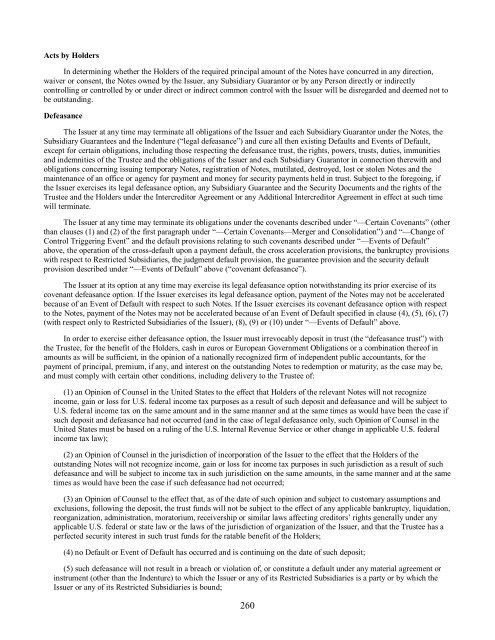iesy Repository GmbH - Irish Stock Exchange
iesy Repository GmbH - Irish Stock Exchange
iesy Repository GmbH - Irish Stock Exchange
Create successful ePaper yourself
Turn your PDF publications into a flip-book with our unique Google optimized e-Paper software.
Acts by Holders<br />
In determining whether the Holders of the required principal amount of the Notes have concurred in any direction,<br />
waiver or consent, the Notes owned by the Issuer, any Subsidiary Guarantor or by any Person directly or indirectly<br />
controlling or controlled by or under direct or indirect common control with the Issuer will be disregarded and deemed not to<br />
be outstanding.<br />
Defeasance<br />
The Issuer at any time may terminate all obligations of the Issuer and each Subsidiary Guarantor under the Notes, the<br />
Subsidiary Guarantees and the Indenture (“legal defeasance”) and cure all then existing Defaults and Events of Default,<br />
except for certain obligations, including those respecting the defeasance trust, the rights, powers, trusts, duties, immunities<br />
and indemnities of the Trustee and the obligations of the Issuer and each Subsidiary Guarantor in connection therewith and<br />
obligations concerning issuing temporary Notes, registration of Notes, mutilated, destroyed, lost or stolen Notes and the<br />
maintenance of an office or agency for payment and money for security payments held in trust. Subject to the foregoing, if<br />
the Issuer exercises its legal defeasance option, any Subsidiary Guarantee and the Security Documents and the rights of the<br />
Trustee and the Holders under the Intercreditor Agreement or any Additional Intercreditor Agreement in effect at such time<br />
will terminate.<br />
The Issuer at any time may terminate its obligations under the covenants described under “—Certain Covenants” (other<br />
than clauses (1) and (2) of the first paragraph under “—Certain Covenants—Merger and Consolidation”) and “—Change of<br />
Control Triggering Event” and the default provisions relating to such covenants described under “—Events of Default”<br />
above, the operation of the cross-default upon a payment default, the cross acceleration provisions, the bankruptcy provisions<br />
with respect to Restricted Subsidiaries, the judgment default provision, the guarantee provision and the security default<br />
provision described under “—Events of Default” above (“covenant defeasance”).<br />
The Issuer at its option at any time may exercise its legal defeasance option notwithstanding its prior exercise of its<br />
covenant defeasance option. If the Issuer exercises its legal defeasance option, payment of the Notes may not be accelerated<br />
because of an Event of Default with respect to such Notes. If the Issuer exercises its covenant defeasance option with respect<br />
to the Notes, payment of the Notes may not be accelerated because of an Event of Default specified in clause (4), (5), (6), (7)<br />
(with respect only to Restricted Subsidiaries of the Issuer), (8), (9) or (10) under “—Events of Default” above.<br />
In order to exercise either defeasance option, the Issuer must irrevocably deposit in trust (the “defeasance trust”) with<br />
the Trustee, for the benefit of the Holders, cash in euros or European Government Obligations or a combination thereof in<br />
amounts as will be sufficient, in the opinion of a nationally recognized firm of independent public accountants, for the<br />
payment of principal, premium, if any, and interest on the outstanding Notes to redemption or maturity, as the case may be,<br />
and must comply with certain other conditions, including delivery to the Trustee of:<br />
(1) an Opinion of Counsel in the United States to the effect that Holders of the relevant Notes will not recognize<br />
income, gain or loss for U.S. federal income tax purposes as a result of such deposit and defeasance and will be subject to<br />
U.S. federal income tax on the same amount and in the same manner and at the same times as would have been the case if<br />
such deposit and defeasance had not occurred (and in the case of legal defeasance only, such Opinion of Counsel in the<br />
United States must be based on a ruling of the U.S. Internal Revenue Service or other change in applicable U.S. federal<br />
income tax law);<br />
(2) an Opinion of Counsel in the jurisdiction of incorporation of the Issuer to the effect that the Holders of the<br />
outstanding Notes will not recognize income, gain or loss for income tax purposes in such jurisdiction as a result of such<br />
defeasance and will be subject to income tax in such jurisdiction on the same amounts, in the same manner and at the same<br />
times as would have been the case if such defeasance had not occurred;<br />
(3) an Opinion of Counsel to the effect that, as of the date of such opinion and subject to customary assumptions and<br />
exclusions, following the deposit, the trust funds will not be subject to the effect of any applicable bankruptcy, liquidation,<br />
reorganization, administration, moratorium, receivership or similar laws affecting creditors’ rights generally under any<br />
applicable U.S. federal or state law or the laws of the jurisdiction of organization of the Issuer, and that the Trustee has a<br />
perfected security interest in such trust funds for the ratable benefit of the Holders;<br />
(4) no Default or Event of Default has occurred and is continuing on the date of such deposit;<br />
(5) such defeasance will not result in a breach or violation of, or constitute a default under any material agreement or<br />
instrument (other than the Indenture) to which the Issuer or any of its Restricted Subsidiaries is a party or by which the<br />
Issuer or any of its Restricted Subsidiaries is bound;<br />
260

















